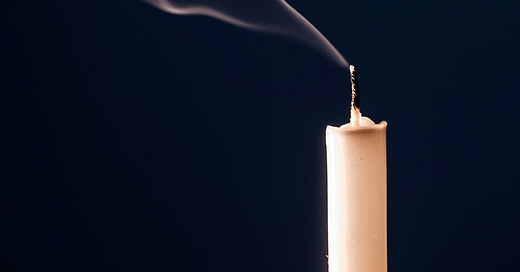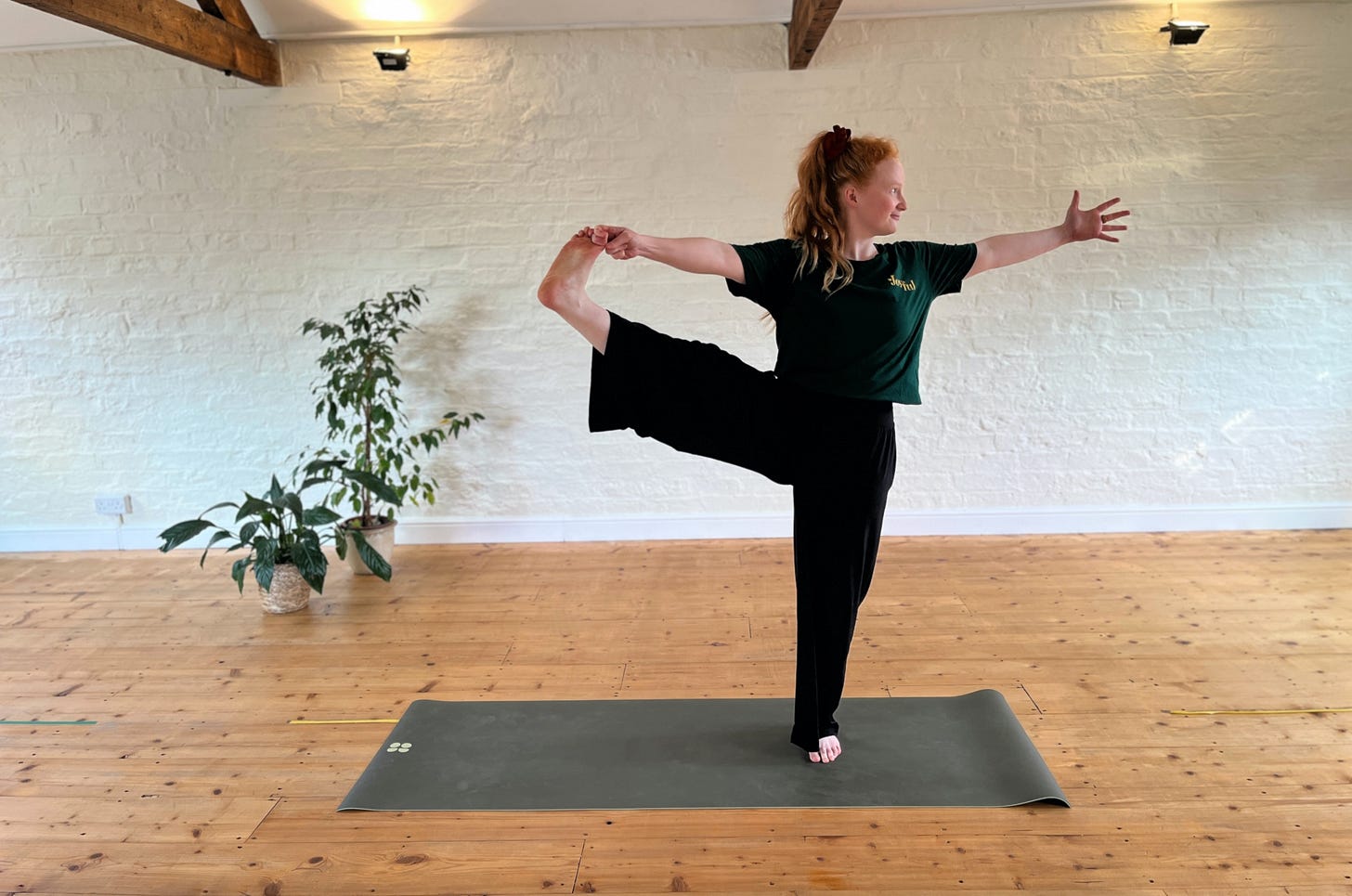How I Broke Free from Burnout
A realistic look at why wellness culture isn’t the cure, and the small steps that actually helped.
I’m writing to you now as someone who’s probably in their most grounded, mentally healthy, and happiest time in their life. But it wasn’t always like this.
I remember, one afternoon a few years back, having to pull my car over because I was having a panic attack. You might know the feeling: a strange tunnel-vision, like the world is suddenly compressive, your lungs rapidly getting smaller and smaller, like they might disappear completely. Nothing else matters except the panic. Life becomes panic. And there’s not much you can do but ride it out.
I remember the burnout. Not the couldn’t-get-out-of-bed for months burnout (although I’ve known plenty of people who’ve been there), but the brushing-my-teeth-makes-me-overwhelmed sort of burnout. Where existence itself became an ordeal. Suddenly (or, perhaps not), everything became hard; every decision, every tiny task, even breathing was a labour. As if there wasn’t quite enough room in my lungs to get the right amount of air in.
I remember that feeling of my life being compressed. A daily struggle to be ‘okay’ and to get life done. Like I was just going through the motions, doing what I needed to do to survive.
And I write this with all grades of privilege; I wasn’t born in a war zone, or with abusive parents. I was relatively healthy, I even had the tools at my disposal (like this one). I had, mostly, everything I needed to thrive.
But yet the challenges came. And perhaps, with them, a layer of guilt, too. Why do I struggle, when so many of my peers are ‘just fine’? How does everyone else make it look so easy? How do they do it—juggling careers or businesses, families and relationships, and wake up looking like that?
So maybe it’s my own flaws. I came into this world a bit broken, a bit incapable, a bit less-worthy. This is all—waves arm enthusiastically in the direction of my malaise—my own innate lacking.
Recognise any of this, my friend?
It’s more of a pandemic than anything else we’ve known. Too many people are off work with mental health issues. Too many people know that exact panicked feeling I described above. Too many of us are comparing ourselves against the toxic miasma of social media. And it’s hard, sometimes seemingly impossible, to get out of it.
But I did. And if any of this resonates, you can get out of it, too.
It starts by recognising that you’re not on your own with this. Everyone you see on social media is living a real, flawed, challenging existence that’s simply shielded from you; I promise, it’s not all sunshine and rainbows (and anyone telling you it is, is in serious denial or is a little delusional).
Next, I want to remind you that wellness-overwhelm (or wellness-hustle) is very much a thing. It’s way too easy to dive into the ‘solution’ to your anxiety by adding more stuff to your plate that, you got it, makes you even more anxious. Don’t fall into the trap of thinking you must start your day with an hour-long meditation at 5am, or that the solution lies in a £5k wellness retreat, or that you think reading all these books on self-care and wellness will fix you (they most likely won’t).
The wellness industry is massive, because so many people feel like crap. But it also too-often pitches a one-size-fits-all solution; you must practice this morning ritual, you must drink this adaptogenic drink, you must meditate, yoga, ice-bath, sauna, nap at 2pm daily, do breathwork, journal, habit-stack, and take all these over-priced and questionable supplements some bloke on a fucking podcast recommended (who, by the way, gets a healthy kickback everytime you purchase).
You don’t have to do all of this stuff to heal yourself, friend. I promise. The way forward—as tried and tested by myself and by those inside my paid Joyful membership and program—is to be gentle with yourself and start really, really small.
Those must-dos I listed above can be overwhelming when all pooled together. But maybe a couple of them ring a little bell of goodness in your head; maybe you feel like the kind of person who wants a regular meditation practice, or who feels the tiniest bit excited about a new movement practice (if the latter is you, I teach a seriously joyful, down-to-earth, and impactful movement style, and my entire toolkit is available inside the Joyful upgrade).
Here’s three simple steps I’d recommend to anyone feeling like I used to feel (and the steps I still take when I notice myself slipping back there):
Step 1
Discover the habit or tool that rings a bell of goodness. Whatever it is. I might not’ve listed it here, and that’s cool, too. It just needs to be something for you, something that you think will help you feel better, and small and inexpensive enough to try out today.
Step 2
Start by trying your new habit out three times a week for 5 minutes. Then, the trick is to really pay attention; do you feel different for it? Does it add-to or take-away from your levels of calm and happiness? Keep at it for a few weeks, becoming curious about it, using the time as an experiment.
Step 3
Then, when you feel ready (and only then), you can add it into more of your days. Slowly building up to your favourite morning routine (not the prescribed one), your favourite movement practice, whatever the thing is. Rinsing and repeating this for the things that truly make a difference to your mindset, your levels of calm, peace, and happiness.
Then: rinse and repeat.
Bonus
I also recommend—and don’t hate me for this—quitting or drastically reducing the time you spend on social media. Yes, it might just be cute dog videos, recipes, or funny memes, but the reality is the constant scroll is training you to be constantly distracted (a close friend of anxiety), and toxic posts, comment-threads, and damaging rhetoric is closer than you think (I read a comment thread of a girl’s body-positive post recently, and the comments about her leg hair were categorically abusive. This, need I remind you, isn’t something we should be okay with adding to our days).
If there’s one thing I want you to take from this, it’s that you don’t have to have it all figured out at once. Healing isn’t a checklist of impossible routines and overpriced retreats, it’s a series of small steps—gentle steps—toward figuring out what truly feels joyful, day by day. The world might shout louder, tell you that you’re not doing enough, but remember, it’s about finding what gives you joy, peace, and space.
So, lean into the small things, the little practices that feel good. They’re worth their weight in gold. And when in doubt, keep it simple, my friend. Because the path to happiness doesn’t demand perfection—it just needs a little bit of courage and a whole lot of kindness.
PS. If you need to make changes in your life, this is what I do best. Discover how I can soothe your anxiety and overwhelm in just a few days inside the paid Joyful subscription here.
Don’t forget to like and share this post…
…by hitting the little ❤️ and share icon at the top or bottom.
And don’t forget to leave a comment:
Have you ever felt wellness-overwhelm?
What small steps have you found helpful in your own journey to combat burnout?
Have you ever felt overwhelmed by social media’s portrayal of well-being? How do you disconnect from that noise?







Thanks for the good word, Chloe! Small, doable, enjoyable changes have big effects over time. I'm reminded of how if you make a 1 degree change to the direction you're walking, driving, flying, etc., in 60 miles you'll be 1 mile away from where you would have been without the change.
So so glad you've found your own way to a healthier, happier you! Appreciate your insights and tips. I especially agree with starting small. If you force change, either in a way that's too big or too fast, you're going to meet a lot of resistance even if it's something you wanted initially. Slow and steady wins the race! ☺️ Keep on writing Chloe! X